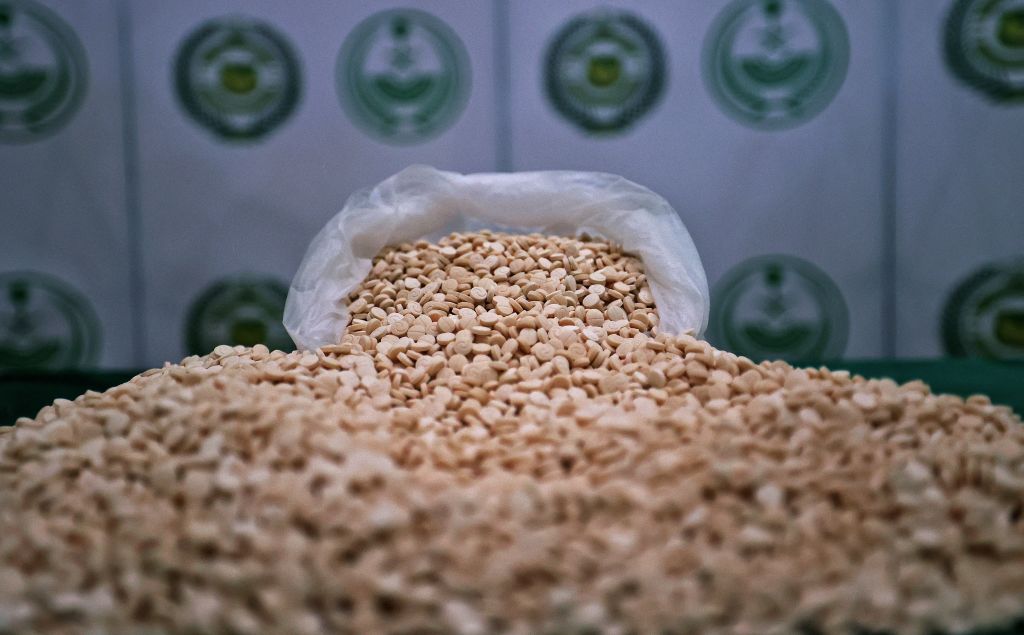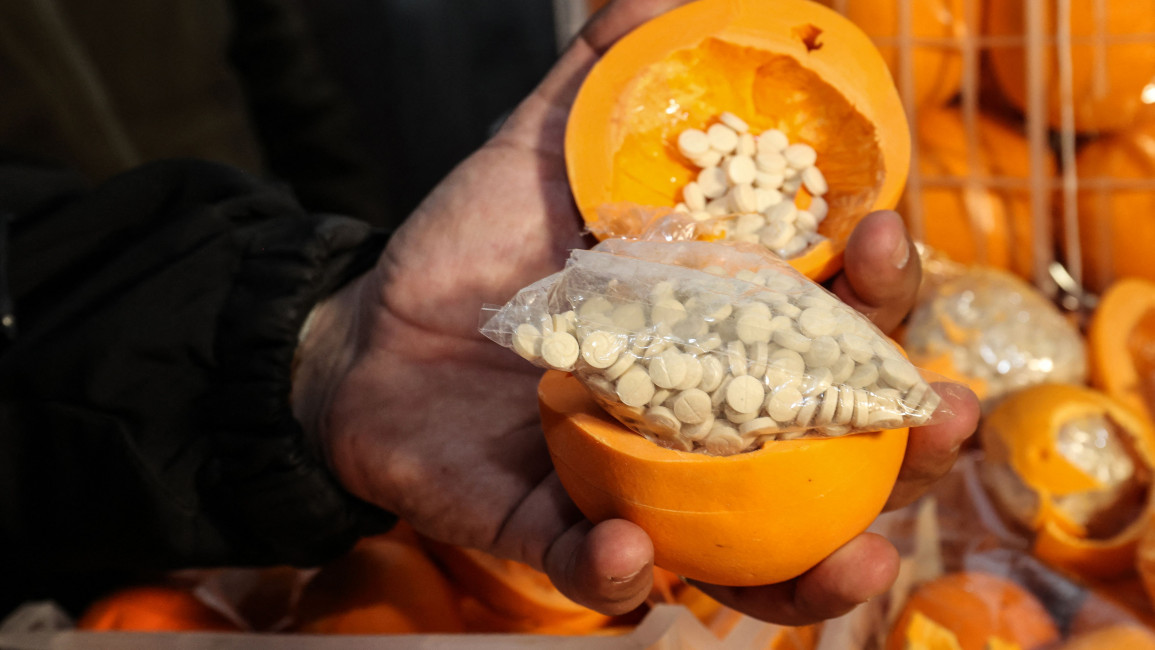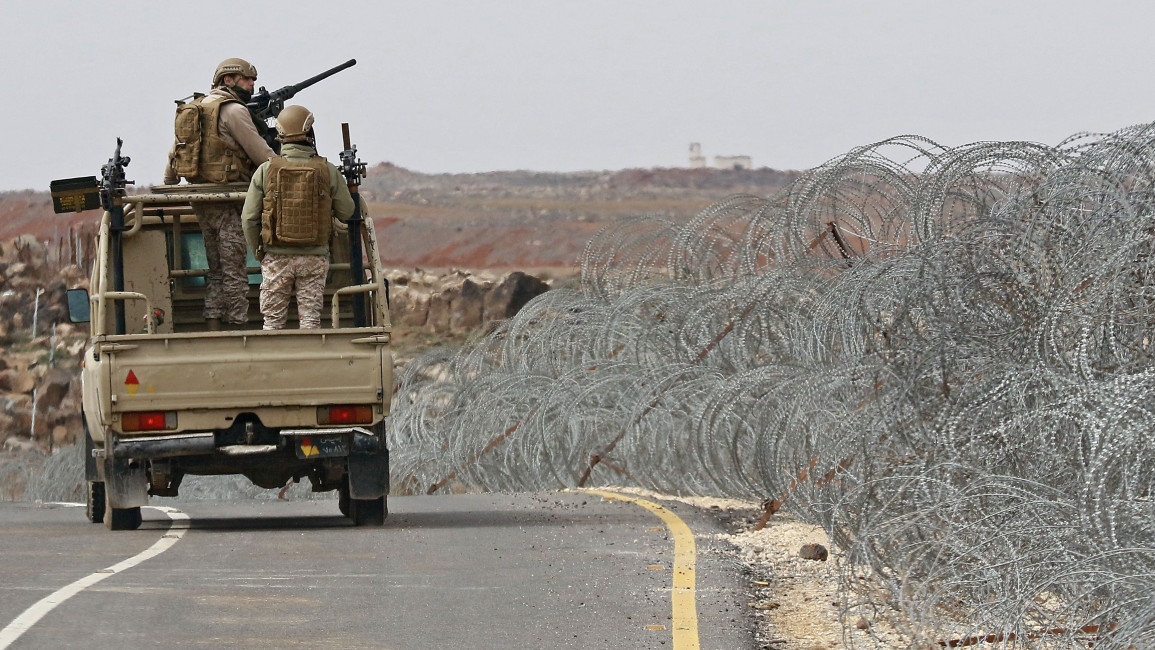'You feel invincible': Inside Lebanon's thriving underground Captagon scene

In-depth
Niko Vorobyov
12 August, 2022
In-depth: Delivering euphoria and alertness, Captagon is popular with partygoers and soldiers alike. The New Arab spoke with smugglers, psychiatrists and drug policy experts about the drug's effects, trafficking, and the emergence of narco-states.
"During the war I saw slaughter, barrel bombs dropped from helicopters, everything you can imagine," Hamza, now a refugee in neighbouring Lebanon, remembered of his time in the Free Syrian Army.
Hailing from the city of Hama, where dictator Hafez al-Assad ruthlessly crushed a Sunni uprising in the 1980s, left him with a burning hatred of the Assad dynasty. So at the time of the Arab Spring, he joined first the protests then the rebellion against Bashar al-Assad.
Throughout history, armies have relied on chemical courage for their troops, and this time was no different. A slightly bitter-tasting pill was handed out among the fighters along with food and water.
“You feel invincible, like Jean-Claude Van Damme; you can defeat anyone,” Hamza recalled. “The effects last up to 48 hours, depending how much you take. Afterwards you feel down, with no power to move, so if you miss the feeling you can take some more. But it’s up to you. I don’t take it any more.”
"Much as cocaine once did in the Americas, [Captagon] is playing an increasingly important role in the Middle East, from powering the Syrian civil war and the Assad regime to fruit exports"
Captagon is a stimulant popular with both Middle Eastern combatants and wealthy partygoers in the Gulf. The effects kick in after about an hour: you feel alertness and a sense of euphoria. Much as cocaine once did in the Americas, it’s playing an increasingly important role in the Middle East, from powering the Syrian civil war and the Assad regime to fruit exports.
Captagon, chemical name fenethylline, was originally produced as a medication to treat narcolepsy and ADHD in the 1960s, but was taken off the shelves in the 1980s for side-effects such as inducing anxiety and paranoia. Production has moved to Syria and Lebanon. After the 2015 Paris attacks, it gained an unfair reputation in Europe as “jihadi speed”, even though the autopsy found no drugs or alcohol in the terrorists’ bodies.
Although most customers are in rich Gulf countries like Saudi Arabia, there’s a market at home in Lebanon as well, with tablets stamped with a double-C logo selling for 50,000 Lebanese pounds (roughly 1.70 USD) a pop.
Fenethylline, which metabolises into amphetamine, is generally considered safer than other drugs of its kind since it doesn’t raise your blood pressure to the same degree, and less addictive because of the indirect route the chemical takes to your brain. But partakers should be cautious.
Hailing from the city of Hama, where dictator Hafez al-Assad ruthlessly crushed a Sunni uprising in the 1980s, left him with a burning hatred of the Assad dynasty. So at the time of the Arab Spring, he joined first the protests then the rebellion against Bashar al-Assad.
Throughout history, armies have relied on chemical courage for their troops, and this time was no different. A slightly bitter-tasting pill was handed out among the fighters along with food and water.
“You feel invincible, like Jean-Claude Van Damme; you can defeat anyone,” Hamza recalled. “The effects last up to 48 hours, depending how much you take. Afterwards you feel down, with no power to move, so if you miss the feeling you can take some more. But it’s up to you. I don’t take it any more.”
"Much as cocaine once did in the Americas, [Captagon] is playing an increasingly important role in the Middle East, from powering the Syrian civil war and the Assad regime to fruit exports"
Captagon is a stimulant popular with both Middle Eastern combatants and wealthy partygoers in the Gulf. The effects kick in after about an hour: you feel alertness and a sense of euphoria. Much as cocaine once did in the Americas, it’s playing an increasingly important role in the Middle East, from powering the Syrian civil war and the Assad regime to fruit exports.
Captagon, chemical name fenethylline, was originally produced as a medication to treat narcolepsy and ADHD in the 1960s, but was taken off the shelves in the 1980s for side-effects such as inducing anxiety and paranoia. Production has moved to Syria and Lebanon. After the 2015 Paris attacks, it gained an unfair reputation in Europe as “jihadi speed”, even though the autopsy found no drugs or alcohol in the terrorists’ bodies.
Although most customers are in rich Gulf countries like Saudi Arabia, there’s a market at home in Lebanon as well, with tablets stamped with a double-C logo selling for 50,000 Lebanese pounds (roughly 1.70 USD) a pop.
Fenethylline, which metabolises into amphetamine, is generally considered safer than other drugs of its kind since it doesn’t raise your blood pressure to the same degree, and less addictive because of the indirect route the chemical takes to your brain. But partakers should be cautious.
RELATEDSyria InsightPaul McLoughlin
“The risks are real and cannot be minimised,” warned psychiatrist Ramzi Haddad. “It can produce delusions, worsen pre-existing psychiatric conditions. It's not frequent but yes, it can be fatal, mainly by cardiac arrhythmias. Even if it is less potent than the classic amphetamine, the fact that it is cheap and readily accessible increases its potential for dependence.”
Captagon pills nowadays are rarely the real deal, and more commonly contain a cocktail of speed, caffeine and other stimulants. Since the last batch of legal fenethylline was produced in 2009, the criminal world has filled the vacuum with dodgy alternatives.
In drug policy circles this is known as the iron law of prohibition: traffickers prefer dealing in more potent substances because they‘re more expensive and take up less space, meaning they’re easier to smuggle. By 2020, Syria was importing 50 tonnes of pseudoephedrine, the key ingredient for crystal meth, for Captagon production.
“For the past three years we’ve been witnessing a trend of young people using synthetic drugs,” said Nadia Badran, the executive director of SIDC, an organisation which provides harm reduction and mental health services to drug users in Lebanon.

Nine million Captagon pills hidden in a shipment of oranges, destined to one of the Gulf countries, were intercepted by customs at the port of Beirut, Lebanon on 29 December 2021. [Getty]
“After a while they become addicted and start to have mental health disorders as an effect of all these drugs. Even though they don't consider themselves addicted, they cannot stop using. They only ask us for support when they are down and they are starting to lose everything, or they have problems with the police and their family.”
Badran added that the situation has worsened since Lebanon’s financial meltdown began in 2019, as more young people lost their jobs and turned to drugs to escape depression and uncertainty.
On top of suffering addiction, the stigma and persecution of drug users further complicates their lives.
“The mindset of the general public is perhaps these people need a jail term because they’ve had no discipline before, and this is why this person became a criminal and a drug addict,” Badran explained to The New Arab.
"Upon arrival, a Captagon trafficker in his mid-thirties told us to leave our phones in the car in case we were being tracked before we sat down at the house of his business partner, a Syrian smuggler"
“If the police suspect someone is using drugs, they can take your phone, search through your numbers, call your friends and parents. And if you are arrested, it stays on your criminal record and you cannot clean it for three years. So imagine, you could stay unemployed for three years because of your record.”
Only an hours’ drive east of Beirut lies the Bekaa Valley, the heart of Lebanon’s narco-business for the past century. Cannabis and poppy plantations sprouted here in the 1920s, at the start of global drug prohibition, then flourished during the 1975-1990 civil war as the various armed factions tried to bankroll their war effort. To this day, the Lebanese government has only a tenuous grip on the valley, which is ruled by tribal clans and the Shia militant group Hezbollah.
Upon arrival, a Captagon trafficker in his mid-thirties told us to leave our phones in the car in case we were being tracked before we sat down at the house of his business partner, a Syrian smuggler.
“I dropped out of school at thirteen to work on the family business - first hash, then Captagon,” said the smuggler.
“After a while they become addicted and start to have mental health disorders as an effect of all these drugs. Even though they don't consider themselves addicted, they cannot stop using. They only ask us for support when they are down and they are starting to lose everything, or they have problems with the police and their family.”
Badran added that the situation has worsened since Lebanon’s financial meltdown began in 2019, as more young people lost their jobs and turned to drugs to escape depression and uncertainty.
On top of suffering addiction, the stigma and persecution of drug users further complicates their lives.
“The mindset of the general public is perhaps these people need a jail term because they’ve had no discipline before, and this is why this person became a criminal and a drug addict,” Badran explained to The New Arab.
"Upon arrival, a Captagon trafficker in his mid-thirties told us to leave our phones in the car in case we were being tracked before we sat down at the house of his business partner, a Syrian smuggler"
“If the police suspect someone is using drugs, they can take your phone, search through your numbers, call your friends and parents. And if you are arrested, it stays on your criminal record and you cannot clean it for three years. So imagine, you could stay unemployed for three years because of your record.”
Only an hours’ drive east of Beirut lies the Bekaa Valley, the heart of Lebanon’s narco-business for the past century. Cannabis and poppy plantations sprouted here in the 1920s, at the start of global drug prohibition, then flourished during the 1975-1990 civil war as the various armed factions tried to bankroll their war effort. To this day, the Lebanese government has only a tenuous grip on the valley, which is ruled by tribal clans and the Shia militant group Hezbollah.
Upon arrival, a Captagon trafficker in his mid-thirties told us to leave our phones in the car in case we were being tracked before we sat down at the house of his business partner, a Syrian smuggler.
“I dropped out of school at thirteen to work on the family business - first hash, then Captagon,” said the smuggler.
RELATEDAnalysisOsama Al Sharif
“I ask the owner of the secret factory to prepare an order, for example one million pills, then I liaise with my partner who sends them elsewhere. The main components are caffeine and amphetamine. Once, we bought an M&M machine to press the pills - it was confiscated by customs, but we brought a chocolatier before the judge to say it was his and we got it back! I buy the tablets for one US dollar each and sell them for ten, leaving me nine dollars profit.”
The trafficker explained that Syria is central to the enterprise.
“Before 2011, the factories were mainly in Syria, and Lebanon was just a passageway. During the war, refugees came here and established factories. Now there are factories on both sides, and those on the Syrian side are protected by their government.”
Figures in Bashar al-Assad’s inner circle have been accused of taking payoffs in return for guarding Captagon shipments and factories. One estimate put the value of intercepted shipments as $5.7 billion in 2021, several times greater than Syria's legitimate exports which stood at merely $860 million in 2020.

Soldiers in the Jordanian army patrolling along the border with Syria to prevent drug trafficking, in response to an increase in Captagon smuggling operations, on February 17, 2022. [Getty]
The trafficker told The New Arab that since he can’t ship to the Gulf directly, he uses Lebanese ports to export to Turkey or Africa, where it’s repackaged and rerouted.
“They hide it in all sorts of ways,” imparted a senior Beirut customs officer, who asked to remain nameless. “Inside shoes, fruits, steering wheels. Inside lemons - it looks fresh but you open it up and there’s Captagon inside. Among animal hides, because they smell so bad no-one wants to check.”
A Captagon shipment hidden in Lebanese pomegranates was uncovered by Saudi officials in April last year, leading the Kingdom to block all agricultural imports from Lebanon. Other loads cross by land.
In January, a convoy of Syrian smugglers drove into Jordan under the cover of a snowstorm. A gun battle erupted with Jordanian soldiers: 27 smugglers were killed, and many others were wounded or escaped back to Syria, leaving behind 3.4 million Captagon tablets and 2,500 packets of hash.
"The banning of Captagon may have caused more trouble than it was worth: the relatively mild fenethylline replaced with stronger substances by a powerful and violent underworld"
“Usually we pay off the customs and our officer tells his men to look another way while we sneak through, but sometimes the elements don’t come together and there’s a firefight. In that case we drop the cargo and run,” said the smuggler.
In the past few years authorities have uncovered some very large shipments. In 2020, 84 million pills were found in the port of Salerno, Italy, possibly after a tip-off from a mafiosi upset at someone else moving drugs through their territory.
“Our biggest risk is informers. We hide it in a professional manner so we’re sure it cannot be found. So when it’s discovered, it’s usually because of an informant,” the smuggler claimed.
Despite these mega-busts, the flow of Captagon continues. Studies have shown that even huge hauls of drugs rarely dent the market, since cartels are ready to lose a portion of their product as an inevitable cost of doing business. In fact, the illusion of scarcity created by drug busts helps keep the business profitable.
The trafficker told The New Arab that since he can’t ship to the Gulf directly, he uses Lebanese ports to export to Turkey or Africa, where it’s repackaged and rerouted.
“They hide it in all sorts of ways,” imparted a senior Beirut customs officer, who asked to remain nameless. “Inside shoes, fruits, steering wheels. Inside lemons - it looks fresh but you open it up and there’s Captagon inside. Among animal hides, because they smell so bad no-one wants to check.”
A Captagon shipment hidden in Lebanese pomegranates was uncovered by Saudi officials in April last year, leading the Kingdom to block all agricultural imports from Lebanon. Other loads cross by land.
In January, a convoy of Syrian smugglers drove into Jordan under the cover of a snowstorm. A gun battle erupted with Jordanian soldiers: 27 smugglers were killed, and many others were wounded or escaped back to Syria, leaving behind 3.4 million Captagon tablets and 2,500 packets of hash.
"The banning of Captagon may have caused more trouble than it was worth: the relatively mild fenethylline replaced with stronger substances by a powerful and violent underworld"
“Usually we pay off the customs and our officer tells his men to look another way while we sneak through, but sometimes the elements don’t come together and there’s a firefight. In that case we drop the cargo and run,” said the smuggler.
In the past few years authorities have uncovered some very large shipments. In 2020, 84 million pills were found in the port of Salerno, Italy, possibly after a tip-off from a mafiosi upset at someone else moving drugs through their territory.
“Our biggest risk is informers. We hide it in a professional manner so we’re sure it cannot be found. So when it’s discovered, it’s usually because of an informant,” the smuggler claimed.
Despite these mega-busts, the flow of Captagon continues. Studies have shown that even huge hauls of drugs rarely dent the market, since cartels are ready to lose a portion of their product as an inevitable cost of doing business. In fact, the illusion of scarcity created by drug busts helps keep the business profitable.
RELATEDIn-depthMujtaba Haris
“We can’t do anything, I’ll be honest with you,” admitted the customs inspector. “It’s like if we seal one crack, another opens.”
The Middle East is repeating the usual mistakes in the war on drugs. The banning of Captagon may have caused more trouble than it was worth: the relatively mild fenethylline replaced with stronger substances by a powerful and violent underworld. Meanwhile, those suffering addiction are pushed to the edges of society by a system that seeks to lock them away.
“What we need now is a change in the law, to stop the criminalisation of people who use drugs,” Badran said in her office while a young man, one of her patients, anxiously waited outside.
Radwan Mortada contributed to reporting.
Niko Vorobyov is a freelance journalist and author of the book Dopeworld.
Follow him on Twitter: @Narco_Polo420
No comments:
Post a Comment